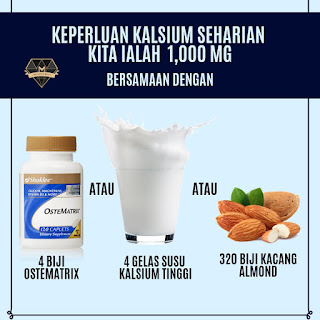 |
| Panduan untuk memilih supplemen Kalsium |
Ramai yg pandang enteng tentang kekurangan calcium dari pengambilan makanan harian, akibatnya badan akan mengambil kalsium yang disimpan di tulang dan gigi utk kegunaan badan..
disebabkan itu, ramai ibu2 yg BF mengadu..mengalami kerosakan gigi..rasa sakit pinggang..sendi..lenguh2.. BEWARE..anda mungkin sedang menggunakan kalsium simpanan hari tua anda ;(
Dipetik dari Harvard Health Publication
NOTE 1:
#Jika anda sedang mencari supplement calcium, pastikan ia mengandungi magnesium! Kenapa?
==> Magnesium ada mineral yg sukar utk disimpan didalam tubuh
==> Magnesium bantu menyerap calcium dan mengekalkannya di dalam tubuh
==> Magnesium bertindak dengan baik bersama calcium utk membina matrix tulang anda yg kuat dan kukuh (utk mengelakkan kerapuhan)
==> Magnesium dan calcium bergabung memberikan kesihatan yg lebih baik pada sistem cardiovascular anda
==> Magnesium dan calcium bergambung membantu mengatasi
masalah insomnia, ia memberikan anda tidur yang lena
NOTE 2:
Jangan lupa, lengkapilah supplemen kalsium anda dengan vitamin D! Kenapa?
==> Vit D memaksimakan penyerapan calcium didalam tubuh
==> Vit D juga membantu regulate calsium didalam peredaran darah
NOTE 3:
Carilah supplemen Calcium dari sumber Calcium Citrate kerana kadar penyerapan ke dalam tubuh lebih tinggi!!
Jadi, kesimpulannya...semuanya terdapat di dalam Shaklee Ostematrix!
1) FDA/RDA dan sebagainya ..recommendation yg dibuat adalah berdasarkan keperluan individu yg IDEAL >>> Sihat tubuh badan tanpa sebarang masalah kesihatan..
2) Calcium toxicity/excess jika diambil 2500 mg >> SETIAP HARI (Earl Mindell)
3) Perlu ingat Calcium ni banyak musuh..
>>> Lebih ratio calcium: phosphorus (normal 2:1) ..so if suke makan high phosporus.. calcium akan deplete
>>> ambil ubat2 ade sesetengahnya mengurangkan calcium absorption, kurangkan calcium dalam darah, tulang..
>>> suke makan lelemak, oxalic acid dalam coklat dan lain-lain makanan.. phytic acid..caffein menghalang penyerapan calcium..
4) Calcium works best with A, C, & iron.. so logic la kan kenapa dalam Multivitamin Vitalea ada calcium.. sebab complement each other.. plus, 225 mg calcium di dalam 1tablet Vitalea tu tak cukup keperluan daily.. sebab tu supplement calcium masih diperlukan..
5) Dalam ESP Soy Isolate Powder ada calcium.. yang ni salah satu criteria pilih soya kan..kene ada calcium..
Not all calcium consumed is actually absorbed in the gut. Humans absorb about 30% of the calcium in foods, but this varies depending upon the type of food consumed [1]. Other factors also affect calcium absorption including the following:
> Amount consumed: the efficiency of absorption decreases as calcium intake increases [1].
> Age and life stage: net calcium absorption is as high as 60% in infants and young children, who need substantial amounts of the mineral to build bone [1,8]. Absorption decreases to 15%–20% in adulthood (though it is increased during pregnancy) and continues to decrease as people age; compared with younger adults, recommended calcium intakes are higher for females older than 50 years and for both males and females older than 70 years [1,8,9].
> Vitamin D intake: this nutrient, obtained from food and produced by skin when exposed to sunlight of sufficient intensity, improves calcium absorption [1].
> Other components in food: phytic acid and oxalic acid, found naturally in some plants, bind to calcium and can inhibit its absorption. Foods with high levels of oxalic acid include spinach, collard greens, sweet potatoes, rhubarb, and beans. Among the foods high in phytic acid are fiber-containing whole-grain products and wheat bran, beans, seeds, nuts, and soy isolates [1]. The extent to which these compounds affect calcium absorption varies. Research shows, for example, that eating spinach and milk at the same time reduces absorption of the calcium in milk [10]. In contrast, wheat products (with the exception of wheat bran) do not appear to lower calcium absorption [11]. For people who eat a variety of foods, these interactions probably have little or no nutritional consequence and, furthermore, are accounted for in the overall calcium DRIs, which factor in differences in absorption of calcium in mixed diets.
Some absorbed calcium is eliminated from the body in urine, feces, and sweat. This amount is affected by such factors as the following:
> Sodium and protein intakes: high sodium intake increases urinary calcium excretion [12,13]. High protein intake also increases calcium excretion and was therefore thought to negatively affect calcium status [12,13]. However, more recent research suggests that high protein intake also increases intestinal calcium absorption, effectively offsetting its effect on calcium excretion, so whole body calcium retention remains unchanged [14].
> Caffeine intake: this stimulant in coffee and tea can modestly increase calcium excretion and reduce absorption [15]. One cup of regular brewed coffee, for example, causes a loss of only 2–3 mg of calcium [13]. Moderate caffeine consumption (1 cup of coffee or 2 cups of tea per day) in young women has no negative effects on bone [16].
> Alcohol intake: alcohol intake can affect calcium status by reducing its absorption [17] and by inhibiting enzymes in the liver that help convert vitamin D to its active form [18]. However, the amount of alcohol required to affect calcium status and whether moderate alcohol consumption is helpful or harmful to bone is unknown.
> Phosphorus intake: the effect of this mineral on calcium excretion is minimal. Several observational studies suggest that consumption of carbonated soft drinks with high levels of phosphate is associated with reduced bone mass and increased fracture risk. However, the effect is probably due to replacing milk with soda rather than the phosphorus itself [19,20].
> Fruit and vegetable intakes: metabolic acids produced by diets high in protein and cereal grains increase calcium excretion [21]. Fruits and vegetables, when metabolized, shift the acid/base balance of the body towards the alkaline by producing bicarbonate, which reduces calcium excretion. However, it is unclear if consuming more fruits and vegetables affects bone mineral density. These foods, in addition to reducing calcium excretion, could possibly reduce calcium absorption from the gut and therefore have no net effect on calcium balance.
So terpulanglah pada orang tu nak kate banyaaaakkk sangat calcium die amek dah... kene juge check body tu.. kalo engine dah kaput.. cell dah banyak yang kaput.. absorption pun kaput.. sbb tu ade orang makan supplement kesan cepat ade yg lambat..bergantung pada kekaputan engine masing2..
Nak dapatkan produk Shaklee?
* Penafian: "Segala testimoni, penulisan dan perkongsian yang dikongsi dilaman ini, bukanlah preskipsi rawatan. Ia adalah berdasarkan pengalaman peribadi dan perkongsian maklumat dari artikel-artikel serta rakan-rakan bagi tujuan perkongsian manfaat.
Jika anda mengalami sebarang masalah kesihatan atau sebarang penyakit, anda digalakkan mendapat nasihat dari doktor dan pakar kesihatan untuk mendapatkan rawatan susulan.”
Kesan pengambilan adalah berbeza pada setiap individu. Suplemen Shaklee ini adalah salah satu medium/alternatif untuk membantu anda, bukan bertujuan utk merawat, mencegah, mendiagnose atau menyembuhkan apa jua penyakit.















0 comments:
Catat Ulasan